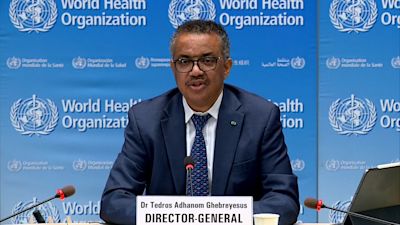World Health Organization chief hopes coronavirus pandemic will be over in two years

The head of the World Health Organization has said he hopes the coronavirus pandemic will end in two years time.
Dr Tedros Adhanom Ghebreyesus, who once described the Covid-19 pandemic as a "once-in-a-century health crisis" cited the Spanish Flu of 1918 - which took a similar amount of time to conclude.
New Zealand extends Auckland lockdown as coronavirus cluster grows
Hunger is a greater fear than coronavirus in South Africa's townships
He added that there is now the technology to stop pandemics - which hadn’t been available a century ago.
"Our situation now with more technology, of course with more connectiveness, the virus has a better chance of spreading, it can move fast," Dr Tedros said.
"At the same time we have the technology and knowledge to stop it."
Across the world 800,000 people have died after contracting coronavirus, with 22 million having tested positive for the illness.
WHO’s emergencies chief Dr. Michael Ryan noted that the 1918 pandemic hit the globe in three distinct waves and that the second wave, which started during the fall of 1918, was the most devastating.
But he said it didn’t appear that Covid-19 was following the same pattern.
"This virus is not displaying a similar wave-like pattern,” he said, before adding: "When the virus is not under control, it jumps straight back up."
Dr Ryan said that while pandemic viruses often settle into a seasonal pattern, that didn’t appear to be the case for the coronavirus.
His comments come just days after WHO repeated warnings that young people are driving the spread of coronavirus globally.
WHO director for the Western Pacific Dr Takeshi Kasai told a virtual briefing: “The epidemic is changing, people in their 20s, 30s and 40s are increasingly driving its spread.
“Many are unaware they’re infected – with very mild symptoms or none at all. This can result in them unknowingly passing on the virus to others.
“This increases the risk of spill-overs to the most vulnerable: the elderly, the sick, people in long-term care, people who live in densely-populated urban areas and under-served rural areas.”
Coronavirus: Should you book a foreign holiday and where can you go?
Holidaymakers scramble to return to UK after new restrictions imposed